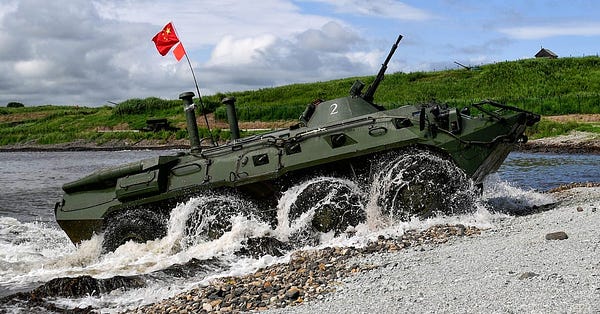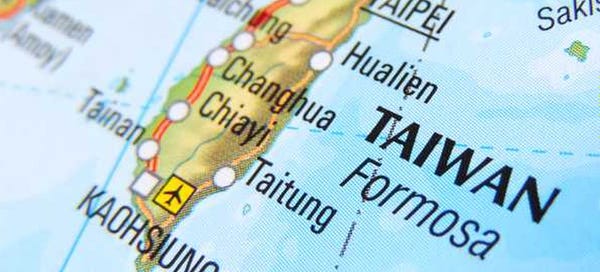Russia invaded Ukraine under the pretext of a 'special military operation' that fell short of a declared war. It is in fact still punishable by 15 years in jail in Russia to call the invasion a war.
China appears to have paid attention. It has now established the basis on which it can label any move it makes against Taiwan in the same way. Chinese President Xi Jinping just signed a directive authorizing the use of Chinese military forces for “non-war” purposes. The Chinese media has stressed that this includes things like peacekeeping operations, disaster relief, and humanitarian efforts. In fact, however, the directive also authorizes the use of the Chinese military to conduct operations that would "aim to protect people's lives and property, safeguard national sovereignty, security, and development interest, and safeguard world peace and regional stability.”
Since Taiwan is officially considered to be a breakaway province by Beijing and its fate an internal matter, one would think action against the island would fall squarely within the Chinese Communist Party’s definition of safeguarding national sovereignty.
Chinese state media has amplified the terms of the directive saying, "These operations can prevent spillover effects of regional instabilities from affecting China, secure vital transport routes for strategic materials like oil, and safeguard China’s overseas investments and personnel."
The parallels with Putin’s special operations language have not gone unnoticed. U.S.-based analyst and China expert Jennifer Zeng has stated her opinion that the directive was specifically related to an impending Chinese move on Taiwan
"I think it's definitely a copy of Putin's 'special operation' language," Eugene Kuo Yujen, an analyst with Taiwan's Institute for National Policy Research," told ABC. "And after what happened in Ukraine, it sends a very threatening signal to Taiwan, Japan, and the surrounding countries in the South China Sea."
Only last week, China's Defense Minister Wei Fenghe told a defense forum in Singapore that China would "fight to the end" to take control of Taiwan, long considered a potential flashpoint for major conflict.
China also recently restated its position that the Taiwan Straits are not international waters and specifically warned the United States to keep its warships out of the area.
Per Chinese Foreign Ministry spokesman Wang Wenbin, “China enjoys sovereign rights and jurisdiction over the Taiwan Strait while respecting the legitimate rights of other countries in the relevant maritime areas. “
While there is considerable speculation about the possibility of a Chinese invasion of Taiwan, the language of the recent directive suggests that what is coming will look much more like China’s patented gray zone warfare than it will a massive use of conventional force. One possible scenario would be the initiation of what American defense experts call a Joint Blockade Campaign designed to pressure the Taiwanese into submission.
A 2020 American Department of Defense study described a Joint Blockade Campaign this way.
“Air and Maritime Blockade. PLA writings describe a Joint Blockade Campaign in which China would employ kinetic blockades of maritime and air traffic, including a cut-off of Taiwan’s vital imports, to force Taiwan’s capitulation. Large-scale missile strikes and possible seizures of Taiwan’s offshore islands would accompany a Joint Blockade in an attempt to achieve a rapid Taiwan surrender, while at the same time, posturing air and naval forces to conduct weeks or months of blockade operations if necessary. China will also likely complement its air and maritime blockade operations with concurrent electronic warfare (EW), network attacks, and information operations (IO) to further isolate Taiwan’s authorities and populace and to control the international narrative of the conflict. Limited Force or Coercive Options. China could use a variety of disruptive, punitive, or lethal military actions in a limited campaign against Taiwan, probably in conjunction with overt and clandestine economic and political activities supported by a variety of IO to shape perceptions or undercut the effectiveness or legitimacy of the Taiwan authorities. Such a campaign could include computer network or limited kinetic attacks against Taiwan’s political, military, and economic infrastructure to induce fear in Taiwan and degrade the Taiwan population’s confidence in their leaders. Similarly, PLA special operations forces (SOF) could infiltrate Taiwan and conduct attacks against infrastructure or leadership targets.”


None of this would have to be done from a standing start. The Chinese regularly send air and naval assets into the area around Taiwan. They have also conducted large-scale cyber-attacks on targets in Taiwan for many years.





Joe Biden is in the White House. He was an empty suit in his prime. That was many, many years ago. Over the years, the Biden family has taken literally tens of millions of dollars from the Chinese Communists. Biden is surrounded by men, like himself, who have gotten rich off of their relationships with Beijing.
This is a once-in-a-lifetime opportunity for the CCP to move on Taiwan. Any day it wants it can start cyber attacks on Taiwanese companies, utilities, and institutions. Without breaking a sweat Beijing can put aircraft and ships around Taiwan and begin to enforce a blockade of imports of food, fuel, and other key materials. The Taiwanese will lack any capacity to respond meaningfully or to break this blockage on their own. They will be isolated and starving in the dark and fully dependent on the United States of America to rescue them.
With Joe in the Oval Office, there is no chance such help will be forthcoming. Surrender will be inevitable.
Call it whatever you want – war or “non-war” – this is the almost inevitable future for the Taiwanese.




I can't shake this vision in my mind of Biden, known plagiarist, dismounting his bicycle, and giving this Neville Chamberlain-inspired statement:
“We, the Chancellor CCP General Secretary, and the American President, have had a further meeting today and are agreed in recognizing that the question of American-Sino relations is of the first importance for our two countries and for Asia.
“We regard the agreement signed last night and the American-CCP Naval Agreement as symbolic of the desire of our two peoples never to go to kinetic war with one another again; especially since we’re waving the white flag after the CCP’s years of unrestricted warfare. We are resolved that the method of consultation shall be the method adopted to deal with any other questions that may concern our two countries, and we are determined to continue our efforts to remove possible sources of difference, and thus to contribute to assure the peace of Asia …"
… "My good friends, for the second time in our history, an American President has returned from Germany Asia bringing peace with honour … I believe it is peace for our time... Go home and get a nice quiet sleep. I will."